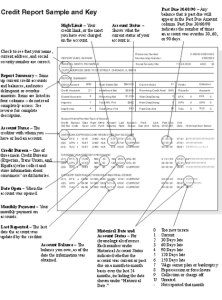There was a time when credit cards were treated with respect. For example, my parents had just one credit card and used it very carefully. They made only a few charges each month and were almost religious about paying off their balances on time every time.
Today, we tend to be more nonchalant about our use of credit cards. They’ve become so commonplace that many of us take them way too much for granted. As a result many Americans are having a problem with debt – due to those little pieces of plastic.
Protecting yourself from overspending
Fortunately, there are things we can do to protect ourselves from credit card abuse. It begins with making some rules about the way your use your credit cards to avoid that sinking feeling of loss when your credit card statements arrive and you see how your balances have swollen to the point where you begin to feel things have become hopeless.
10 tips for avoiding credit card problems
Here are 10 tips that for smart credit card use than can help prevent this from happening.
1. Pay more than the minimum. If you pay only the minimum amounts due on your credit cards each month, you’re basically sentencing yourself to credit card hell. In fact, if you do this you might literally never get out of debt. One example of this is if you owed $10,000 and made just a minimum payment of $30 or $40 every month, it could take you as long as 18 years to become debt free. On the other hand, if you were to make more than the minimum required payment, you’d be out of debt in no time. As an example of how this works watch the following video to learn how one family paid off $12,712.65 in credit card debt in just a year.
2. Pay off your cards. This may seem obvious but the best way to stay out of trouble with credit card debt is to pay off your cards. If you have a card with small balance, pay it off first, then go to work on your other cards. If you concentrate on knocking off your debts one at a time, you might be surprised at how quickly things get better.
3. Be smart about how you charge. Make sure you never run up a card to its limit. When you use a card sensibly, it will have a very positive effect on your credit. Conversely, if you run up your balance to the max, this will have a negative effect. The reason for this is that when a financial institution checks your credit one of the most important things it will look for is how much credit you have available vs. the amount you’ve used. This is called your debt-to-credit ratio and the lower it is, the better. So if you must have a balance on one of your cards, make sure you keep it low.
4. Don’t take cash advances. Cash advances come with much higher interest rates than when you use a credit card to make purchases. If you have an emergency and no other choice, it might be acceptable to take a cash advance but otherwise, stay away from them – especially those “checks” you probably get periodically from one or more of your credit card companies.
5. Always pay on time. No matter what else is going on in your life financially be sure to pay your credit card bills on time. Most financial experts say that just one late payment can drop your credit score by as many as 50 points. This could easily move you from having “good” credit to “poor” or even “bad” credit, which could cost your money because of the higher interest rates you will be charged.
6. Don’t be afraid to negotiate. Go online periodically and check to see what other cards might be available with lower interest rates than the ones(s) you have now. If you find one with a better interest rate, call your current credit card provider and ask it to match that better rate. Smart consumers do this almost every month. And if your current credit card issuer won’t match the other card, transfer your balance to it.
7. Keep an eye on your account. If you’ve been paying any attention at all to the news recently you know that there was a credit card breech that affected more than 90 million Target customers. Now, more than ever, you need to keep an eye on what’s happening with your cards. Go online and check your balances regularly – at least once a week – to make sure all the purchases you see are yours If you spot any fraudulent activity, contact the credit card company immediately and alert them as to the problem.
8. Be careful about transferring your credit card information. Don’t send your credit card information via the Internet unless you’re positive the site is secure. There are phishers out there just waiting to steal your information. Never transfer a credit card number, your social security number or other important financial information to a site unless you’re positive it’s secure and trustworthy
9. Keep your credit card accounts open. When you pay off a credit card, don’t make the mistake of closing the account. This will lower your credit score because one of the five components used to calculate your score is “length of credit history.” If you were to close out an account you’ve had for a long time this would definitely ding your credit score. Plus, it would affect the total amount of credit you have available, which in turn would damage your debt-to-credit ratio.
10. Get your credit reports on a regular basis. There was a report issued by the Federal Trade Commission last year that one in five Americans have errors in their credit reports and that 5% have errors so serious, it could be damaging their credit scores. You can get your credit reports free once a year, either from the three credit reporting bureaus – Experian, TansUnion and Equifax – or on the site www.annualcreditreport.com. The best way to get your reports is one at a time at three-month intervals. That way you would be able to monitor your reports yourself and avoid the expense of paying some company to do it.
What to look for
When you review your reports, look for negative items such as late payments, defaults, accounts that have gone to collection and missed payments as these are what would damage your credit score the most. If you do find one or more of these items, make sure they aren’t errors. If you do find a mistake, you need to immediately write the credit bureaus and dispute it. You will need to have documentation supporting your claim. But if you do this the credit bureau is required by law to contact the financial institution that provided the information and ask that it be validated. If the institution that provided the information can’t validate it or fails to respond within 30 days, the credit-reporting bureau must, by law, delete the information from your credit file. As you might imagine, this could give your credit score a nice and immediate boost – maybe by as many as 50 or 100 points.
In summary
The net-net of credit card usage is actually pretty simple. Just use your credit cards wisely and with common sense. Don’t run up huge balances you can’t pay off at the end of the month, never take cash advances and keep an eye on your accounts. Do this and you will be able to take advantage of the convenience of having a credit card without the danger of a person or an originator of the will and of falling into credit card debt hell.





